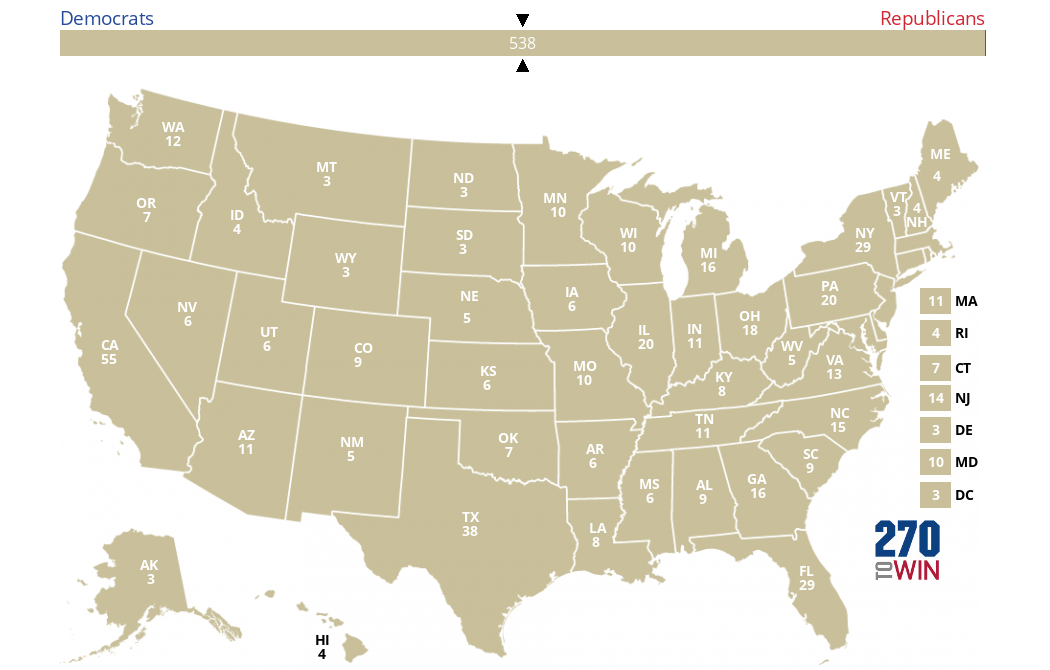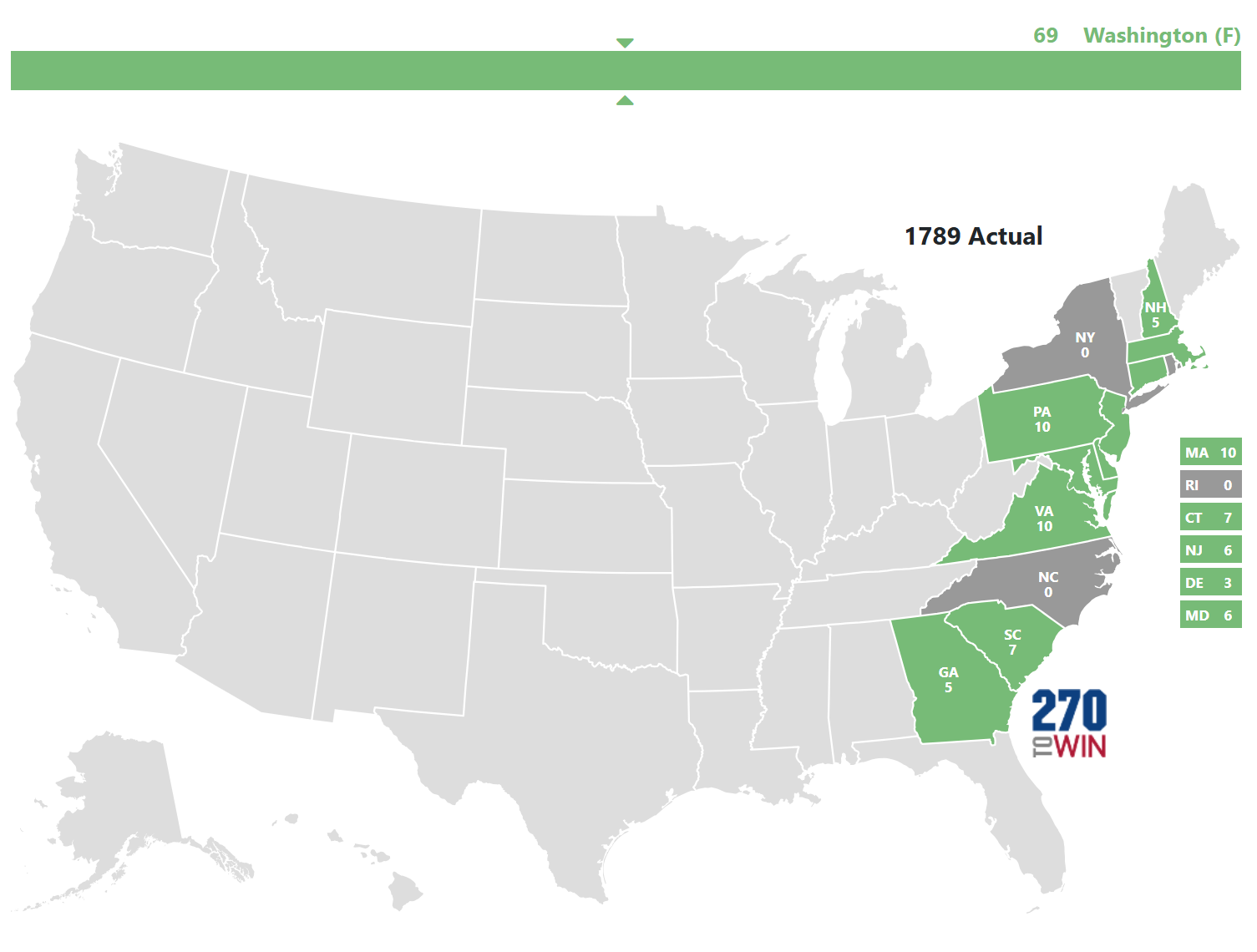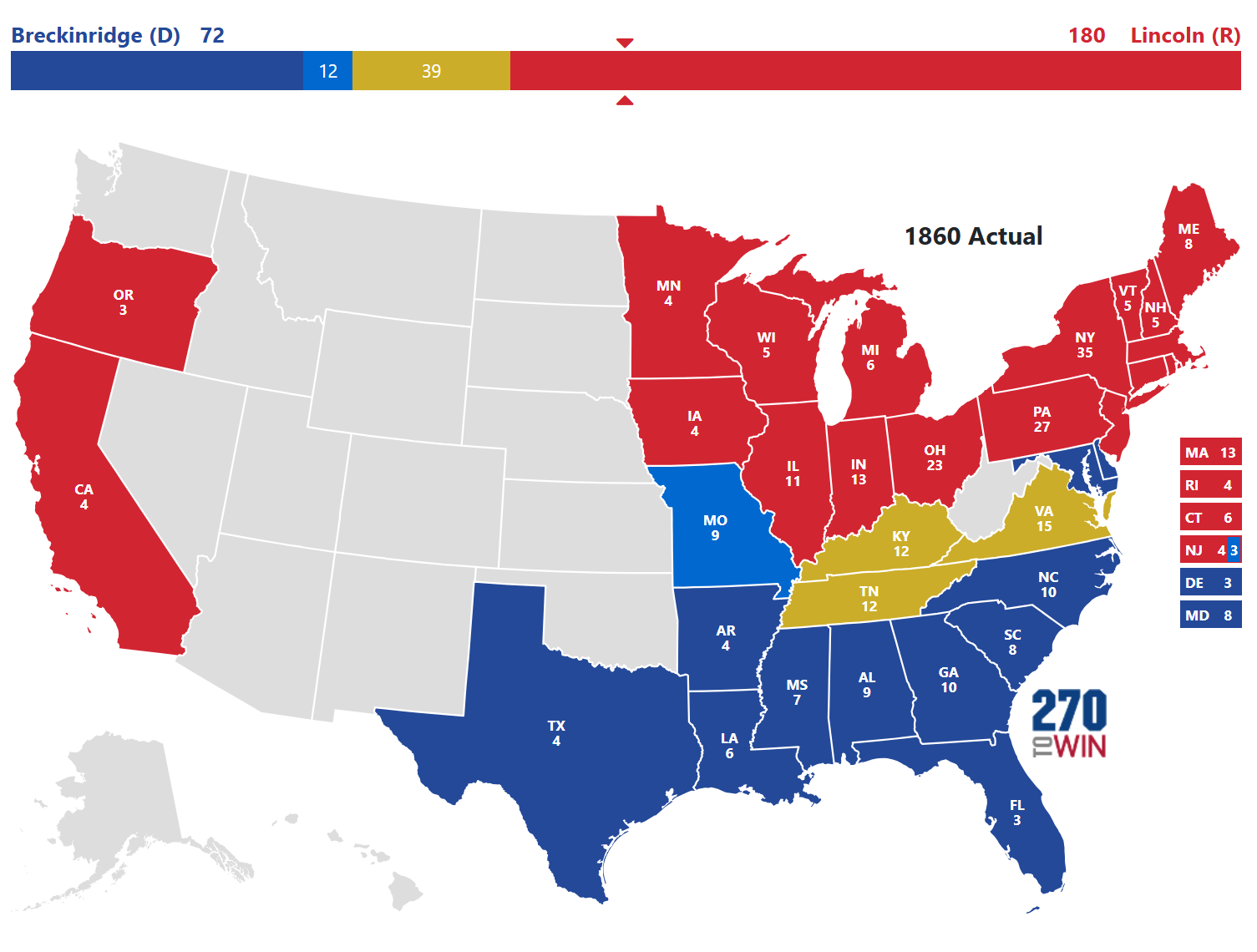|
American elections are fundamentally broken as evidenced by the last 18 years from Florida 2000 to Florida 2018, the 2016 Dem/GOP Primary, Gerrymandering, etc. This thread will act as a place for us to discuss what the hell happened/how did we get here and ways we can solve it. The Current State of Things The United States is currently made of 50 states, each with a Governor and 2 Legislative Houses (except Nebraska because they're weird). All states also elect a set number of representatives to the United States House and 2 Senators to the United States Senate. The House is currently made of 435 members and the Senate has 100 Senators. Each state also votes once every 4 years for Electors for the United States Presidency, with each State getting electors equal to the number of Representatives and Senators they have. It gives us a map that looks like this:  Two things should immediately jump out, first there are a lot of states with <10 Electoral votes 9 EVs: Alabama, Colorado, South Carolina 8 EVs: Kentucky, Louisiana 7 EVs: Connecticut, Oklahoma, Oregon 6 EVs: Arkansas, Iowa, Kansas, Mississippi, Nevada, Utah 5 EVs: Nebraska, New Mexico, West Virginia 4 EVs: Hawaii, Idaho, Maine**, New Hampshire, Rhode Island 3 EVs: Alaska, Delaware, District of Columbia*, Montana, North Dakota, South Dakota, Vermont, Wyoming For a total of 159 EVs or 30% of the total. There are only 6 states with at least 20 EVs and they are distributed thusly: 55 EVs: California 38 EVs: Texas 29 EVs: Florida, New York 20 EVs: Illinois, Pennsylvania For a total of 191 EVs or 35% of the total. How We got Here However, things were not always split up this way. Look at how the map was distributed in 1789, our first Presidential election:  In the first map every single state was within 7 EVs of each other, with only a single state getting the minimum. 1860, another pivotal election also had a fairly even distribution of state size, with only 2 (OR and DE) getting the minimum:  Clearly something has changed to have a situation where we now have 16% of the states in the Union getting the minimum number of EVs, up from. And that thing was the Apportionment Act of 1929. Prior to this, after every decennial census the US would increase the size of the House based on the new population census. This was stopped in 1929 with the size of the House permanently fixed at the levels it was at during the prior census. Wikipedia explains the rationale: quote:In 1920, the Republicans removed the Democrats from power as the Whigs had done in 1838, taking the presidency and both houses of Congress. Due to increased immigration and a large rural-to-urban shift in population from 1910 to 1920, the new Republican Congress refused to reapportion the House of Representatives with the traditional contiguous, single-member districts stipulations because such a reapportionment would have redistricted many House members out of their districts. A reapportionment in 1921 in the traditional fashion would have increased the size of the House to 483 seats, but many members would have lost their seats due to the population shifts, and the House chamber did not have adequate seats for 483 members. By 1929, no reapportionment had been made since 1911, and there was vast representational inequity, measured by the average district size; by 1929 some states had districts twice as large as others due to population growth and demographic shift. Since every state must get at least one representative this has the effect of giving very tiny states a much larger say in things than they otherwise should, or a natural gerrymander. But before we talk about natural gerrymanders, let's first dive into gerrymandering as it's commonly discussed, in relation to the US House re-apportionment. What Is Gerrymandering? As the US Constitution requires all states to have contiguous districts every census every state must re-draw the lines that determine the boundaries of the districts their representatives have. This is required to be based on US Census results and done every 10 years in a process known as "reapportionment". Historically this was done based on natural boundaries or communities but in the past 100+ years the practice of drawing the maps in a way to disadvantage your political opponents or minorities has taken over. This got so bad the Voting Rights Act of 1965 banned the practice of racial gerrymandering (although political gerrymandering was still okay). A well-gerrymandered map will look completely insane to an outside observer:  With political gerrymandering legal in the US as of right now, if a party controls a state's Governorship, Lower House and Upper House (aka a "trifecta") they will be able to draw a gerrymandered map when re-apportionment happens every decade. It's incredibly powerful as a gerrymander can take a fairly even distribution of votes and give you something that looks like this:  Or this:  But that's nothing compared with the natural gerrymander I spoke of earlier. Natural Gerrymandering or Why the Senate is Undemocratic Remember the electoral maps we looked at earlier? The reason you see a changing distribution of electoral votes is because America is urbanizing at a rapid rate. In fact quote:David Birdsell, dean of the school of public and international affairs at Baruch College, notes that by 2040, about 70% of Americans are expected to live in the 15 largest states This doesn't seem like that much of a problem, as the decennial re-apportionment will give those states more and more representatives. Except, every state regardless of size gets 2 Senators. This will result in 70% of the country only having 30 Senators while the remaining 30% of the country will have a super-majority of 70 Senators despite being a super-minority of the population.  Yikes! That doesn't seem very democratic or fair. To sum it all up, the US currently has serious issues with how it elects everyone to the Federal government: Presidents, Representatives and Senators. With the problem hopefully now illustrated I'd like to discuss some ideas for how we fix these problems. There are a lot of popular solutions and I encourage people to discuss others but the ones I'll be covering are: -Abolishing the Electoral College -Banning Gerrymandering -Admit More States -Expanding the House -Proportional Representation -Neutering the Senate Abolishing the Electoral College or the Inter-State Compact In 1876, for the first time ever, a President was elected who did not win the popular vote.  It was a shitshow and people who want to know more should check out the US Presidents thread for a detailed write-up: https://forums.somethingawful.com/showthread.php?threadid=3849787 In 2000, for the second time ever, a President was elected who did not win the popular vote. This was made worse because the electoral vote winner barely won the state of Florida.  This happened again in 2016 and this time the popular vote wasn't even close.  Fortunately, there's a better way and it just might happen in our life-time! It's something called The National Popular Vote Interstate Compact (NPVIC) and it's an agreement among a group of U.S. states and DC to award all their respective electoral votes to whichever presidential candidate wins the overall popular vote in the 50 states and the DC. It's also set up so it will only take effect if enough states sign on to ensure the popular vote winner is elected (i.e. they need 270 electoral votes). Unfortunately, so far only blue and blue-leaning states have adopted it, but there is currently nothing stopping every state from signing on, it's only the GOP's stranglehold on rural power that keeps them from endorsing it.  Banning Gerrymandering While there is no law currently banning gerrymandering at the federal level, several states have taken it upon themselves to do so. California, Arizona, Idaho, Washington, Iowa and New Jersey have taken the power of redistricting out of the hands of their state legislature and into theoretically non-partisan/fair redistricting systems. Pennsylvania's Supreme Court recently ruled that gerrymandering was illegal and it created a new map for the 2018 midterm elections. North Carolina has also had it's gerrymander ruled illegal and numerous states such as Michigan, Colorado and Ohio have had their voters approve anti-gerrymandering rules. Abolishing Gerrymandering would take us from a national house map that looks like this:  To one that could look like this:  Admit More States Currently 4.4 million people living in DC and the US territories receive no representation in Congress and (with the exception of DC), no vote for President. This is approximately the population of Idaho, Montana, Wyoming, and the Dakotas combined  Adding these areas as US states would help balance the urban/rural divide in the Senate, although the overall problem would still exist. Expanding the House As discussed earlier, the House has not increased in size since the early 1900s, giving it one of the worst population:representative ratios in the world  By expanding the size of the House, the power of rural states would be diluted in both the House and Electoral College. Proportional Representation https://www.youtube.com/watch?v=QT0I-sdoSXU A hypothetical mixed-member proportional system in the US would make the House more like the Bundestag in Germany or other states that use a method of proportional allocation of seats. The NYTimes made a hypotehtical mixed-member proportional map, seen below:  https://www.nytimes.com/interactive/2018/11/10/opinion/house-representatives-size-multi-member.html This not only would alleviate issues related to representation ratios but it would also fix the inherent problems of a first past the post voting system in which a two-party dichotomy naturally is created and the polarization of the Republican Party has broken the natural ways this system moderates the political climate. If you want to vote DSA instead of Democrat, a mixed member system would be the best way to potentially achieve that goal. Neutering the Senate The last, and probably most controversial voting reform plan is to somehow neuter or reduce the power of the Senate. While the Constitution orders that every state is entitled to equal representation in the Senate, and with a clause making amendment of that subject to 100% ratification instead of the usual 75%, there is another way to reduce the power of the Senate. The Senate could be reduced to an advisory body similar to the UK's House of Lords through a normal amendment. Each state would still receive 2 Senators, but their power would be largely ceremonial. Hopefully this thread will be a good place to discuss on-going voting reform efforts like a new Civil Rights Act, gerrymandering's legal status as well as a place for us to discuss other hypothetical solutions. This is not the place to wage a slapfight about if voting matters/doesn't matter, please take it elsewhere. Thanks everyone! axeil fucked around with this message at 14:34 on Nov 12, 2018 |
|
|
|

|
| # ? Apr 25, 2024 02:54 |
|
This is a clearer demonstration of what gerrymandering is if that helps any:
|
|
|
|
great writeup, OP. personally my favored immediate solution would be making DC and Puerto Rico states, at the very least. getting puerto rico some representation would be a good first step in getting some disaster aid from the hurricanes that have devastated the island. i would also be in favor of a constitutional amendment against gerrymandering, though it's tough to imagine a way of actually enforcing it that wouldn't be purely partisan since the gains are so clearly immediately beneficial for one party. i feel like it could just as easily be enforced so lopsidedly as to be useless. not sure how to prevent that.
|
|
|
|
Stexils posted:personally my favored immediate solution would be making DC and Puerto Rico states, at the very least. getting puerto rico some representation would be a good first step in getting some disaster aid from the hurricanes that have devastated the island. this this this and i'd wager puerto rico is itching for statehood after what trump did to them
|
|
|
|
Condiv posted:this this this It's sort of complicated, there's a non-trivial anti-colonial sentiment movement there as well so it's not cut and dried. I think something needs to change for Puerto Rico tho, the hurricanes will only get worse.
|
|
|
|
To solve gerrymandering simply eliminate congressional districts and have any person who gets over 30,000 votes become a representative. The voting power of a representative will be directly proportional to the amounts of votes they received. This means everyone's vote will count unless they voted for some obscure candidate who didn't even get 30,000 votes. Keep the Senate as-is because otherwise there would be no point in having separate states, and I'd say that some built-in balkanization in a nation is a good thing because it lets people who don't like each other to stay away from each other. Eliminate direct elections for the President. Instead have the House majority appoint a President and a Senate majority confirm their choice.
|
|
|
|
Lightning Knight posted:It's sort of complicated, there's a non-trivial anti-colonial sentiment movement there as well so it's not cut and dried. I think something needs to change for Puerto Rico tho, the hurricanes will only get worse. I understand this sentiment but it's a weird one to have since as it stands they are basically an exploited colony right now. Giving them statehood would increase their power and influence not lessen it.
|
|
|
|
Axetrain posted:I understand this sentiment but it's a weird one to have since as it stands they are basically an exploited colony right now. Giving them statehood would increase their power and influence not lessen it. I believe the counterargument is not that they should remain a territory, but that they should be an independent country. It's my understanding every referendum and poll they take on the subject has the option to stay with the status quo, and that may be untenable now. I'm not super knowledgeable about Puerto Rico specifically, I just know that there is a non-trivial faction that would prefer independence over statehood. I think if the majority population supported that, we should honor their wishes even if that is politically inconvenient for American progressives.
|
|
|
|
qkkl posted:Keep the Senate as-is because otherwise there would be no point in having separate states, and I'd say that some built-in balkanization in a nation is a good thing because it lets people who don't like each other to stay away from each other. the senate is effectively how 30% gets to nullify what the remaining 70% wants By 2040 70% of Americans will live in 15 states, thus 30% of the country, which is guaranteed to be older, whiter, more religious gets to vote for 70% of the upper chamber of the legislature the senate is probably bigger electoral problem than everything else combined Typo fucked around with this message at 00:23 on Nov 12, 2018 |
|
|
|
Typo posted:the senate is effectively how 30% gets to nullify what the remaining 70% wants The 70% can also nullify what the 30% want with the House. By having both a House and Senate the states are forced to work together in order to do anything on a national scale. If there was no Senate the 70% could just vote to spend 95% of tax revenue on the 70% states. And you know what they say about "no taxation without representation"...
|
|
|
|
I'm going to quote a good effortpost about Puerto Rico here:Wiggy Marie posted:I can only speak from my personal and family's points of view, so definitely don't take this as island gospel!
|
|
|
|
qkkl posted:The 70% can also nullify what the 30% want with the House. By having both a House and Senate the states are forced to work together in order to do anything on a national scale. If there was no Senate the 70% could just vote to spend 95% of tax revenue on the 70% states. And you know what they say about "no taxation without representation"... that's still a better situation than allowing the 30 percent to veto anything the 70 percent wants.
|
|
|
|
qkkl posted:The 70% can also nullify what the 30% want with the House. By having both a House and Senate the states are forced to work together in order to do anything on a national scale. If there was no Senate the 70% could just vote to spend 95% of tax revenue on the 70% states. And you know what they say about "no taxation without representation"... Actually even if there isn't a senate the house is still going to be 30-40% composed of delegates from smaller, less populated states. Which is enough to make sure federal funds is fairly allocated. quote:And you know what they say about "no taxation without representation"... what you are arguing for is over-representation for rural states, which I'm actually ok with, just not to the degree where California which has more population than 22 other states put together gets 2% of the upper chamber of the legislature while the other 22 states gets 44% Typo fucked around with this message at 01:19 on Nov 12, 2018 |
|
|
|
Stexils posted:great writeup, OP. Thanks! One way you could do it is to mandate something related to the efficiency gap and/or mandate that every stare allocates things based on an algorithm. Lightning Knight posted:I believe the counterargument is not that they should remain a territory, but that they should be an independent country. It's my understanding every referendum and poll they take on the subject has the option to stay with the status quo, and that may be untenable now. I'm not super knowledgeable about Puerto Rico specifically, I just know that there is a non-trivial faction that would prefer independence over statehood. I think if the majority population supported that, we should honor their wishes even if that is politically inconvenient for American progressives. This is also a good point. I think the next POTUS should say that every colony (Pueto Rico, us virgin islands, guam, samoa, etc) is having an immediate referendum on independence or being a state, status quo not an acceptable option. I have no idea how territories work exactly and if the us government can just kick territories out but this would be the way you could finally end colonialism. axeil fucked around with this message at 01:29 on Nov 12, 2018 |
|
|
|
My wish list of reforms, increasing in unlikelihood with number: 1.) Destroy or neuter the Senate. 2.) Chop up States into geographically compact districts that receive reps proportional to population. Aggregate low-pop districts until they reach the threshold for one rep, across state lines if necessary. Edit: use preferential/Aussie-style voting here, particularly for high-population districts, so that minority blocs still get some representation 3.) Make Prez election popular vote only, trigger a runoff if lead is less than 1% 4.) Institute a French-style Parliamentary system with a House Cabinet led by a PM who sets policy, President now functions as either opposing veto or as superpresident, French-style Kulkasha fucked around with this message at 02:45 on Nov 12, 2018 |
|
|
|
Cross posting from the news thread. https://twitter.com/SeanTrende/status/1061647085647343616 Between this, we also need to grant DC and PR statehood, ensure all states have early voting, paper ballots, and vote by mail with no lovely signature matching laws. What else am I missing? Oh yeah, bipartisan commissions to draw district maps, and an end to partisan gerrymandering. I'm sure there's more electoral changes needed, but that would be a great start.
|
|
|
|
I do some work with a voting reform group (outside the US) and I'd be very interested to hear any information or local perspectives about Maine's implementation of ranked-choice voting.
|
|
|
|
Last Radiolab was on ranked choice voting it is worth a listen https://www.google.com/url?sa=t&sou...d=1541992051832
|
|
|
|
Doctor Spaceman posted:I do some work with a voting reform group (outside the US) and I'd be very interested to hear any information or local perspectives about Maine's implementation of ranked-choice voting. Not a maine local, but everything I know of ranked choice indicates it is superior to what we do now.
|
|
|
|
This stuff makes for fun thought experiments, but how do can we actually deliver these reforms? What kinds of reforms can be passed with simple majority in the Senate? The problem with passing these kinds of reforms through the normal legislative process is that both parties are going to have members from places currently benefiting from the system as it exists. I'm not sure Democrats will be able to rely on, say Vermont Senator Patrick Leahy to vote to reduce Vermont's national influence.
|
|
|
|
Squalid posted:This stuff makes for fun thought experiments, but how do can we actually deliver these reforms? What kinds of reforms can be passed with simple majority in the Senate? Well we can start with gerrymandering at the state levels. CO just implemented a bipartisan commission to draw districts via ballot initiative. We've seen Pennsylvania take the issue to their Supreme Court with decent results. Change is possible, albeit slow and patchwork as hell.
|
|
|
|
Squalid posted:This stuff makes for fun thought experiments, but how do can we actually deliver these reforms? What kinds of reforms can be passed with simple majority in the Senate? A lot could be done legislatively, really; Congress has a lot of power over elections. The Fair Representation Act, for example, is ranked choice voting (specifically single transferable vote, which is a good way of handling representatives) on a national level for House reps and is/was being pushed in the House, and could be passed like that, no amendments or anything required. The issue of both parties wanting to keep a hold of their unfair advantages is still a problem for things like that, mind, and it doesn't affect the Senate, but still, a whole lot could be accomplished through Congress with simple majorities. A proper gerrymandering ban, some form of proportional representation in the House (which itself would stop gerrymandering almost, though not completely, on its own really), increasing the size of the House, and other stuff. Roland Jones fucked around with this message at 05:18 on Nov 12, 2018 |
|
|
|
Heck Yes! Loam! posted:Well we can start with gerrymandering at the state levels. CO just implemented a bipartisan commission to draw districts via ballot initiative. We've seen Pennsylvania take the issue to their Supreme Court with decent results. Change is possible, albeit slow and patchwork as hell. Yeah gerrymandering is comparatively easy to fix, although it has its own problems. For example if Democratic controlled states enact unilateral gerrymandering reform, it puts them at a national disadvantage against Republicans, who won't have so many scruples in the states they control. However a national level fix seems like it would be easier to manage politically than say an effort to neuter the Senate.
|
|
|
|
Squalid posted:This stuff makes for fun thought experiments, but how do can we actually deliver these reforms? What kinds of reforms can be passed with simple majority in the Senate? You need something akin to the level of popular support for electoral reforms that you had during the progressive era 100 years ago for example, popular election for senators was passed through the senate, despite senators losing their seats because of it, because the degree of public support for it had reached critical mass by the early 1900s The easiest reform that could be passed in the immediate future is to abolish the legislative filibuster in the senate
|
|
|
|
axeil posted:Yikes! That doesn't seem very democratic or fair! It's not supposed to be democratic or fair to majority population. That's why we have the House for that. The Senate is a representative of a republic. Sad that I have to quote Quora of all loving places in order to explain something we all learned in middle school civics, but: quote:It isn't "fair", but "fair" isn't always the goal of a republic, so put that notion out of your head. A republic is FIRST concerned with stability, prosperity and liberty. If you don't like it, then stop swarming the coastal cities and start inhabiting the "flyover" states you look down upon so much if you want a Senate majority that reflects your interests.
|
|
|
|
Shiki Dan posted:It's not supposed to be democratic or fair to majority population. The Senate is undemocratic as poo poo and a majority of people should have their interests represented by people who actually represent those interests. People move to cities because there's more people and generally speaking more opportunity than somewhere in the middle of nowhere. As it happens, these places tend to have policies that have tremendous social benefit, as opposed to places in the Midwest that are governed by people scared of their own shadows if your solution is "lol sucks to suck" I don't think you're actually interested in discussing the solution to fixing things
|
|
|
|
Shiki Dan posted:If you don't like it, then stop swarming the coastal cities and start inhabiting the "flyover" states you look down upon so much if you want a Senate majority that reflects your interests. Oh man, I wonder what your political predilections are given this rhetoric. The Senate, Electoral College, and even the Presidency itself shouldn't be dismantled because they are undemocratic institutions - though they are, and and that is bad. They should be dismantled because they empower garbage ideologies and politics. Nobody cares what suburban shitheads from Paul Ryan's district think about policy because their opinions are garbage and they are a tiny minority. I know, I'm from the suburbs of Paul Ryan's district.
|
|
|
|
Shiki Dan posted:If you don't like it, then stop swarming the coastal cities and start inhabiting the "flyover" states you look down upon so much if you want a Senate majority that reflects your interests. This is a very odd statement. Rather that building a government that reflects the nation it represents, you are suggesting we engage in a massive social engineering scheme on the scale of China's Great Leap Forward. All to mash the American people into some arbitrary and nonsensical mold designed over two hundred years ago. That doesn't make any kind of sense. Of course you are right that this inequality of representation is by design. I don't think its entirely harmful either. I think there are real benefits to the distributed power in the federal government, for example I think its good how Congressmen hunting for pork get Federal spending distributed across the country, rather than concentrated in a single megalopolis like Paris or London in France and England. However the increasing scale of inequality in representation is going to present problems down the road. If representation becomes as unequal as it is predicted, and if economic power also continues to become increasingly concentrated, the odds of the problem being settled through extra-Constitutional means increases. The more out of proportion representation becomes, the larger the odds powerful states will seek to force the issue, regardless of whether they have a bill that can pass the Senate. Still if one is mostly just interested in increasing the power of Democrats, I think the most realistic options are statehood for DC and Puerto Rico. Not that Puerto Rico would be reliably Democrat, but I think it would lean that way. Unfortunately DC statehood would only exaggerate the power imbalance between small and large states, and DC Senators would probably join with those from states like the Dakotas to block reforms that would weaken the Senate. Squalid fucked around with this message at 07:19 on Nov 12, 2018 |
|
|
|
Shiki Dan posted:It's not supposed to be democratic or fair to majority population. The senate is an archaic 18th century institution unsuited for governing a 21st century technologically advanced nation-state. Their purpose was originally to rope the smaller colonies into joining the Union: but the sort of federation that the senate was meant to serve had long ceased to exist. The senate no longer serve the purpose the founding father foresaw for it originally, which was to represent state governments instead of the people. Senators were originally appointed by state legislatures rather than elected by the people, but that went away with the 17th amendment and popular election for senators. So now it's just to give someone living in Wyoming more voting power than someone living in New York, which was never the point. quote:If you don't like it, then stop swarming the coastal cities and start inhabiting the "flyover" states you look down upon so much if you want a Senate majority that reflects your interests. People are not going to live in economically depressed states just so their voting power increases, so for the sake of tradition, necessary reforms don't get passed: and America falls further behind the rest of the world. quote:This individuality has faded somewhat in recent years, but it isn't gone. The states are represented in the most powerful chamber of the Congress as equals: the Senate. They stand as equals for the same reason that China and Luxembourg have the same number of representatives in the UN: it's a body of nations, not of populations. It isn't intended to be a body of populations, only nation states. Hint: China is the UNSC, Luxembourg isn't, the UNSC has power, the general assembly doesn't Typo fucked around with this message at 07:35 on Nov 12, 2018 |
|
|
|
Shiki Dan posted:It's not supposed to be democratic or fair to majority population. Many, if not all u.s. states are arbitrary lines on a map.
|
|
|
|
Shiki Dan posted:It's not supposed to be democratic or fair to majority population. If fairness isnít the goal of your republic, then thereís something wrong about your republic, friend! This quora post youíve quoted is pretty bad at making the case for the Senate. Representing the states for the sake of it is pretty undemocratic, and invoking concepts as nebulous as "liberty" is basically the last refuge of the ideologue with no further argument. The truth is that States are a relic of the past and ought to be abolished. It is nonsensical that your nation devolves so much autonomy and sovereignty to them, especially in matters of civil and human rights. They sure as hell need no representation because they are not people, and in a democracy - which should be the end goal of any nation - only people (but all the people) get a voice.
|
|
|
|
Flowers For Algeria posted:It is nonsensical that your nation devolves so much autonomy and sovereignty to them, especially in matters of civil and human rights. With my dying breath, I whisper: "But the Civil War was for states' rights!"
|
|
|
|
Giggy posted:Many, if not all u.s. states are arbitrary lines on a map. Arguably the only ones that aren't are ones that were independent countries or distinct colonies. So the original 13 colonies, Hawaii and Texas are the only states that aren't arbitrary. And Texas was a bunch of slaveholders trying to grab some Mexican territory for themselves so it's less a distinct political entity than Hawaii or even the original 13 colonies were.
|
|
|
|
Flowers For Algeria posted:If fairness isnít the goal of your republic, then thereís something wrong about your republic, friend! The thing is extreme centralization isn't inherently good. Many Democrats today want to decrease the power of the states because it would advance their agenda. However I'm not sure a system with less power in small states will necessarily always be better for the left in the future. Devolving autonomy on human rights means states will probably vary more on this metric, but I don't think it likely to change the average. There are certainly downsides to decentralized governance. For example both NASA and the European Space Agency have distributed their facilities across much wider geographic areas than is necessarily rational and optimal. This is because obtaining funding for these projects requires support from many regions, which are rewarded with manufacturing facilities and other economic infrastructure. As a result these agencies incur inefficiencies that make them more expensive. However overcentralization can also incur its own inefficiencies. For example in his book Seeing like a State James C. Scott described how the 19th century government of Paris was determined to insure as many rail lines as possible ran through Paris, as this was seen furthering national unity and central power. Unfortunately this was often not the rational or optimal route, and many unnecessary expenses were incurred to this end. areas off the lines suffered economically from neglect, as the centralized rail infrastructure paid for by the whole country helped concentrate ever more resources in the metropole. I've seen people in the UK thread complaining constantly about exactly this kind of problem with London, with the city hogging a disproportionate share of resources. Even in the US, where Washington DC is a relatively small city, it still vacuums up Federal money in the form of Federal jobs and prestige monuments that rationally have no reason to all be in the same place. You may have problems with my example from France, I admit I'm going from memory here. Still I'll argue that there's no reason to assume centralization is always more rational and fair than Federalism.
|
|
|
|
While it's true that centralization has disadvantages, a lot of processes devolve into races-to-the-bottom if not adequately centrally controlled. Since the federal government is the only entity that can print currency, the federal government is also the only entity that can adequately spend through recessions and depressions. We saw this during the 2007 recession and a lot of state governments still haven't recovered from the crunch. That makes the federal government the only reasonable place to control welfare programs / universal healthcare / etc. (of course with state partnerships). I'm not sure what you mean by humans rights not changing on average, but averages are absolutely meaningless when it comes to human rights. If you have some states arresting suppressing and promoting violence against their minority populations, the existence of other equitable states don't somehow offset that, just like averaging together billionaires with the poor doesn't somehow make the poor better off. Stickman fucked around with this message at 08:38 on Nov 12, 2018 |
|
|
|
If the Senate issue isn't solved, the blue states honestly should look into forming a quasi government-within-a-government through interstate compacts.
|
|
|
|
Axeil, Iíd like to thank you for a great and meaty OP, but Iím kinda sad that it doesnít stray too much from the D&D orthodoxy in terms of policy proposals. Which is why Iíd like to introduce the following ideas into the debate and see what yíall think about them (Iím perfectly conscious that most of them would require scrapping the Constitution but letís not stay attached to a text just because it was written by long-dead quasi-mythical political leaders): - Political representation for residents, not merely nationals, essentially decoupling citizenship from nationality. Because everyone has a stake in their own living and working conditions. There are historical precedents for this, although they are uncommon, but the US used to be a pioneer in these matters. The revolutionary French constitution of 1793 (that never came into force) would have allowed citizenship for foreigners living and working in France after a year of residence. In the EU, European foreigners may vote in the local elections of their country of residence. More relevantly, many States in the US used to allow the vote for certain kinds of aliens, up until the 1920ís - check out the Wikipedia article devoted to the historical examples of this. Whatís interesting is that this seems to be constitutional, and would only require implementation through law. - Getting rid of the states. Seriously. Or at least, removing their authority on a lot of matters. Squalid makes great points on the ills of centralization turned up to 11 but thatís not exactly what I called for, and Iím pretty conscious of the downsides of living in a country that has one metropolis of over 12 million people and nothing else over 2,5 million. But I think America would be pretty immune to such imbalances given how DC is dwarfed by the rest of the country. I still feel like statesí sovereignty is disproportionate, and I feel like electoral laws (ffs!), education, labor, family, morals, contract, water and a bunch of other laws and rights probably shouldnít fall within the purview of the states - merely because they are all essential and it is absurd in my view that there should be inequalities between people on these topics. Would you at least grant me, Squalid, that wresting electoral law from the clutches of the states would do much to cleanse American democracy? Is it at all feasible? The VRA seems like it merely had a regulatory effect on electoral law, but could a potential future new VRA hand over the electoral process to a federal authority? I would like it if a constitutional scholar could post more about the intricate details of federalism and its current legal underpinnings. If thatís not too far off topic. - National referendums. You have local ballot initiatives and thatís a good (because it is inherently democratic in its essence) and a bad thing (I just read about how Floridaís ballot initiatives were worded and ho boy). So it all depends on implementation and breadth, but national referendums on pretty much any topic except for the removal of civil and human rights sound pretty good to me. Iíve been phoneposting for a while and have now arrived at work, so Iíll stop here for now. What do yíall think?
|
|
|
|
axeil posted:The Senate could be reduced to an advisory body similar to the UK's House of Lords through a normal amendment. Can the powers of the Senate be reduced in any way without a constitutional amendment? Because I had the impression that those were essentially impossible now (ERA etc).
|
|
|
|
Oh dear me posted:Can the powers of the Senate be reduced in any way without a constitutional amendment? Because I had the impression that those were essentially impossible now (ERA etc). No because the Constitution is what lays them out and good loving luck getting two thirds of senators to vote to take their own powers away. Even if we had a constitutional convention good luck getting 38 states to agree to reduce their powers, too. fast cars loose anus fucked around with this message at 09:34 on Nov 12, 2018 |
|
|
|

|
| # ? Apr 25, 2024 02:54 |
|
fast cars loose anus posted:No because the Constitution is what lays them out and good loving luck getting two thirds of senators to vote to take their own powers away. Then it seems to me there is no constitutional way out of the problem and the sooner this is recognized the better. Maybe more populated states could look at setting up alternative structures, a 'Proportional Senate', a 'Reformed Court' and so on, and try to give those bodies powers instead? If nothing else they'd be institutions that were ready to go after a fight.
|
|
|





























